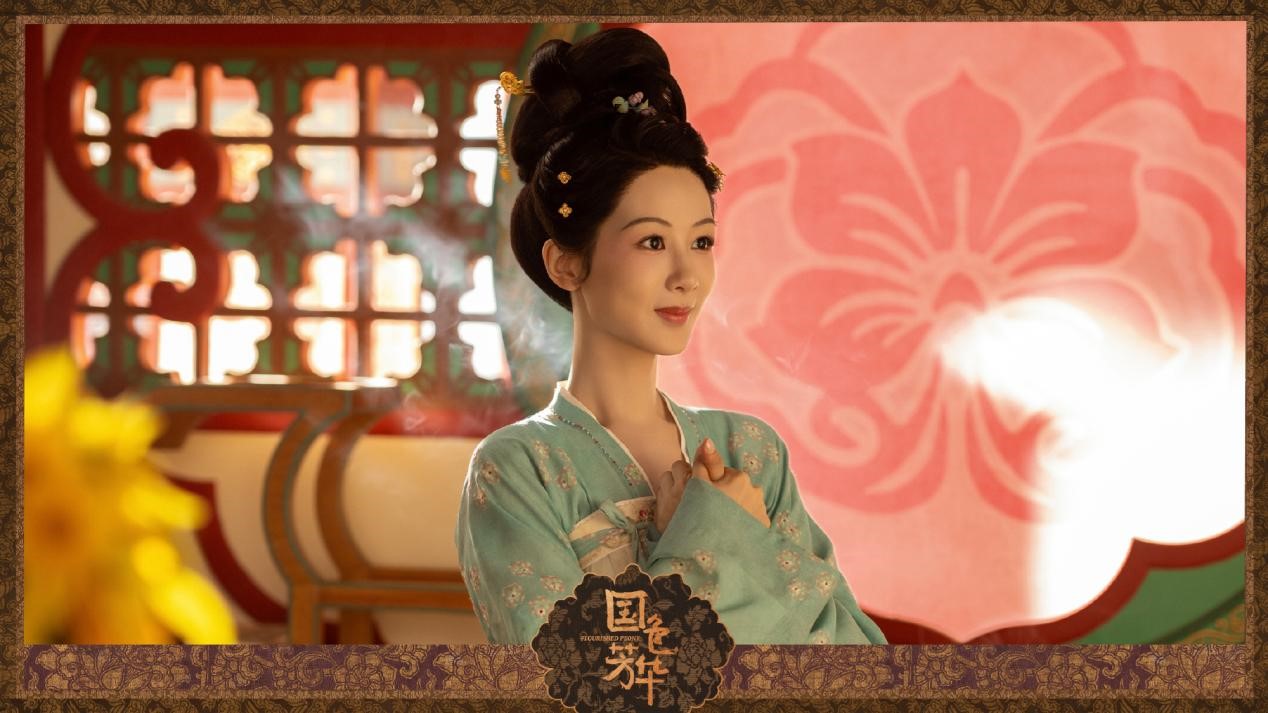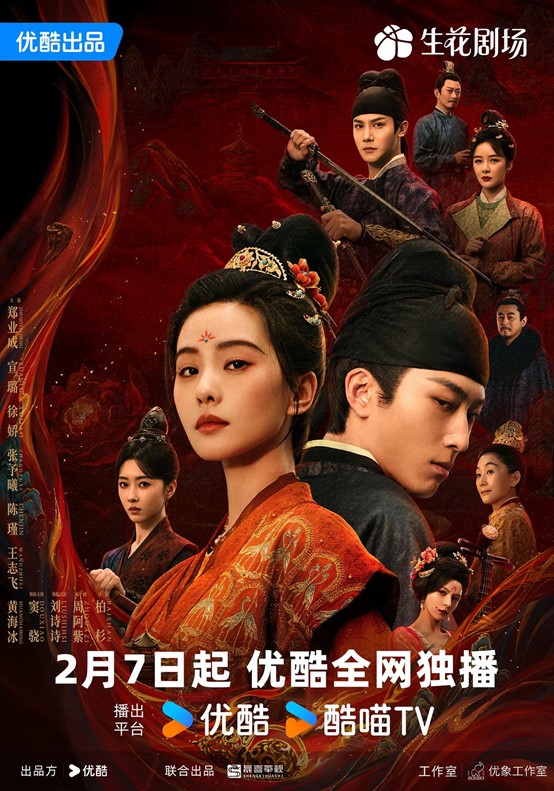
The audience can tell with their naked eyes whether a drama has been carefully produced. The opening credits of "National Beauty" give people a clear idea of what to expect. The drama is set in the Tang Dynasty, and the political culture, folk customs, architecture, gardens and daily life of the Tang Dynasty are accurately restored in the drama; the composition, lighting, color matching and music are exquisite, presenting a very harmonious sense of antiquity and beauty, and the aesthetics are excellent.
In addition to excellent production, it is ultimately necessary to touch people's hearts with a story.
In order to save her seriously ill mother, He Weifang/Mudan (played by Yang Zi) had to accept a marriage of interest exchange and marry into the Liu family, a family of officials. In the Liu family, she had to face the difficulties of her parents-in-law and endure the contempt and cold treatment of her husband Liu Chang (played by Wei Zheming).

He Weifang, nicknamed "Peony" (played by Yang Zi)
Faced with the death of her mother due to fake medicine and the death of her close maid who was like a sister to her, He Weifang began to fight back against the injustice of the Liu family. Although she divorced Liu Chang, she survived a narrow escape and finally fled Luoyang to Chang'an.
Living in a big city is not easy. He Weifang gradually gained a foothold in Chang'an with her talent for growing peonies and unremitting efforts. With the help and support of the flower and bird envoy Jiang Changyang (played by Li Xian), the flower business became bigger and stronger, which not only achieved women's self-reliance and self-improvement, but also laid the foundation for the road of revenge in the future.

Jiang Changyang (played by Li Xian)
From the perspective of story type, "The Beauty of China" is a popular female-led business drama in the past two or three years. However, based on previous experience, most female-led business dramas have ended in failure.
A fundamental reason is that the heroine's business activities are overly dependent on the support and participation of the hero. Whether it is the generation of ideas, the acquisition of resources or the resolution of crises, the male presence is too strong, making the so-called women's business more like a product of male empowerment rather than a display of women's autonomous power.
This is actually a major difficulty in many dramas with female protagonists: how to handle the relationship between the heroine and the male protagonist, how to make it romantic without weakening the subjectivity of women?
On the one hand, even a drama with a strong female lead cannot be without a male lead. After all, romantic plot is one of the important elements to attract the audience. Through the male lead's favor, care and support for the female lead, it can create a fascinating love scene and enhance the emotional appeal of the story.
But on the other hand, if the heroine's growth is driven too much by the help of the hero, or the heroine's image becomes fragile, thin, and dependent, it will fail to convey the true power of women, and the so-called heroine will become just a slogan.
The key is to find a balance so that the audience can feel the genuine emotional connection between the hero and heroine (CP feeling) without making the heroine appear weak and powerless.
What is commendable about "The Beauty of China" is that it strikes a good balance. He Weifang needs Jiang Changyang's resources, and Jiang Changyang, who seems to be greedy for money but is actually righteous, is willing to lend a hand. Even though he has sympathy in his heart, he only helps when necessary for a long time; although he helps He Weifang, He Weifang's brilliance has never been obscured by this.
For example, at the beginning, Liu Chang tried to take He Weifang by force after drinking, causing her to be injured. In order to successfully leave the Liu family, He Weifang deliberately stabbed her shoulder with scissors to strengthen the evidence of being injured by Liu Chang, and went to Jiang Changyang's residence to seek help. Jiang Changyang saw through her plan at a glance, and He Weifang said nothing, directly snatched the fan from Jiang Changyang's hand, and stabbed the wound again with the handle of the fan.
Jiang Changyang's attitude was, "Young Madam is fearless in her pursuit of freedom, and I admire her for it," but he soon began to "feel sorry" for his fan, saying that it was a gift from a saint and was very expensive.

Admiration is admiration, conditions are conditions
He Weifang then "threatened" Jiang Changyang, saying that if he didn't help her, it would be evidence of his hurting others, and that He Weifang also knew the "flaw" of Jiang Changyang's "hiding his weakness". Although the threat was light, He Weifang said, "People who are desperate have no choice but to give it a try, even if there is only a one in ten thousand chance". She also told Jiang Changyang that if he helped her, he would also get benefits...

He Weifang "threatens" Jiang Changyang
With a sense of justice and after weighing the pros and cons, Jiang Changyang finally agreed to help He Weifang, but he still did not forget to "settle the account" with He Weifang.

Help is help, but money is indispensable
In this plot, He Weifang is a bit "cruel" and Jiang Changyang looks a bit "cold", which is not like the style of many ancient idol dramas - when the male protagonist sees the female protagonist being bullied, he immediately applies medicine to the female protagonist's wound and unconditionally helps her to get justice.
He Weifang's "ruthlessness" highlights her subjectivity and initiative. She was a weak woman in the social order at that time, but also a strong woman who took the initiative to seize even a one-in-ten-thousand chance and seek to change her fate. She used "coercion and inducement" to win Jiang Changyang's support.
Jiang Changyang's "coldness" - neither completely indifferent nor unconditional help - adds a layer of depth to the character. He is not a simple "hero saving the beauty" template character. He has justice in his heart and sympathizes with He Weifang's situation, but "greed for money" and "hiding one's shortcomings" are his consistent protective colors. He has a greater mission, and He Weifang will never let him make a complete exception.
Afterwards, He Weifang fled from Luoyang to Chang'an. She was faced with the dilemma of having no household registration and finding a job everywhere. She was forced to work in a tavern. The male owner Wang Qing had bad intentions. She resisted stubbornly and escaped from the clutches of the devil. By chance, she met Jiang Changyang again and asked Jiang Changyang to help her get a fake household registration document.
Jiang Changyang's condition was twenty pots of Qiongtai Yulu. Although a household registration document was a piece of cake for him, he still asked for a high price.
He Weifang tried to bargain down to ten basins. Jiang Changyang asked in confusion, "Why did you run away from the Liu family and come all the way to Chang'an instead of going back to your own parents' home?" He Weifang told him what happened to her after she escaped from the Liu family, and she hoped that Jiang Changyang would show some mercy.

Jiang Changyang's Lion Opens His Mouth
Jiang Changyang still said in a nonchalant tone: "This is my noble hand, you can sign it or not." In other words, twenty pots of Qiongtai Yulu were already a favor from him, and no matter how miserable He Weifang's experience was, he did not relax the conditions. Jiang Changyang was not unkind, he did help He Weifang get the household registration documents immediately, but the price he asked for was not reduced by a cent.

Jiang Changyang: "Business is business"
If this scene was written by an ancient romance drama: when the male protagonist learned of the female protagonist's miserable experience, he would not only help her get the household registration documents, but also arrange everything for her residence.
In "The Beauty of China", Jiang Changyang is still "cold", still showing his shrewd and calculating side, and will not easily give up because of a momentary soft heart. His character setting is consistent. He Weifang bargained to no avail and had to accept this harsh condition. This scene further reinforces this important message: any help He Weifang received from Jiang Changyang was "conditional", and she needed to pay the corresponding price and bear the consequences for it, echoing her statement of "self-reliance".
When He Weifang learned that Wang Qing had beaten Wu Niang and intended to sell her to Huanyun Tower, He Weifang made a difficult decision: agree to give Wang Qing ten strings of money in exchange for Wu Niang's divorce letter to help Wu Niang out of her predicament. Almost penniless, He Weifang mortgaged the precious jade necklace left to her by her mother to the owner of Yun to raise the money.
Jiang Changyang asked He Weifang: "You are dying, how can you save others?" Yun, the shop owner, was also shocked because He Weifang had told her that the jade necklace was her mother's relic and she treasured it the most. But He Weifang believed that no matter how precious the jade was, it was not as important as human life.
Let's first talk about the writing of this plot: it could be He Weifang asking Jiang Changyang for help; or when He Weifang decided to pawn the jade necklace left by her late mother, Jiang Changyang couldn't bear it and decided to help He Weifang pay the ten strings of money; or, afterwards, Jiang Changyang redeemed the jade necklace from the owner of Yun and returned it to He Weifang...
"The Beauty of China" did not fall into the rut. He Weifang paid a huge personal price to buy freedom for Wu Niang, which reflects her deep friendship with her friends, the mutual help between women (Wu Niang saved He Weifang before, and this time He Weifang saved Wu Niang), and He Weifang's noble heart and character; at the same time, it also gives the character of He Weifang a deeper meaning - even in difficult situations, she is not a weak woman waiting for a hero to save her, but a strong individual who is capable, responsible, and willing to pay the price for justice.

No matter how big the predicament is, He Weifang always relies on herself to resolve it
Although He Weifang and Wu Niang started their business smoothly, Wu Niang's ex-husband Wang Qing was rejected for his pity and reconciliation. He held a grudge and incited hatred. He led old customers to He Weifang's house and shouted, "Why not sell smiles?" He threatened to smash and destroy the house and demanded a refund. He Weifang was filled with grief and anger. With tears in her eyes, she looked at her mother's portrait and erased the "乐" and "宀" from "安乐", leaving only the word "女" - how difficult it is for a woman to be happy. When the theme song sung by Tan Weiwei sounded, the audience couldn't help but cry. But He Weifang wiped away her tears, waited for a stick of incense to burn out, and then regrouped to face the difficulties.

This scene made the audience feel sad
At this moment, Jiang Changyang happened to see this scene from the window. There was pity and heartache in his eyes, but he did not help. "She is the one who can be covered by the sky when it falls." He thought He Weifang could handle it, and He Weifang could handle it.

Jiang Changyang repeatedly "stood aside and watched"
In many moments like this, the audience can't help but guess, Jiang Changyang should be attracted to He Weifang? It's normal for Jiang Changyang to like such an extraordinary woman. But no matter what, his "money-loving" and "corrupt official" persona is still there, and every time he helps He Weifang, he has his own purpose. Helping her is true, maybe liking her is also true, but "using" her is also true.
For example, during the hunting trip in Qingliang Mountain, he wanted to use He Weifang to "escape"; when doing business with He Weifang, he actually took away 90% of the profits (from a business perspective, it was indeed "black"); He Weifang was cheated when she rented a house, which happened to be Jiang Changyang's backyard, and he said, "A lone girl bravely ventured into Chang'an, but before she could realize her ambitions, she was cheated of all her money. It really makes people cry." The next sentence immediately urged He Weifang to work harder to make money. After all, he could not take a single cent less of his 9% profit. Then he asked his servants to move He Weifang's things out of his backyard... He really had no sympathy for women.

When He Weifang heard that Jiang Changyang's so-called "sympathy for women" meant that they had to "move out" their luggage, her face changed drastically.
In this way, the relationship between He Weifang and Jiang Changyang is not based on romantic idealism, but an equal transaction relationship, which is both credible and interesting. This is the mutual struggle, collision, mutual understanding and mutual attraction between two smart, independent, interesting and equally "money-loving" souls, rather than one who depends on the other.
Finally, halfway through the plot, Jiang Changyang showed some compassion for He Weifang and put a cape on her in the cold wind. He Weifang subconsciously refused, "What an ugly thing, I don't want it." Jiang Changyang said, "It's embroidered with gold thread, your favorite gold nugget." He Weifang's eyes lit up when she heard the word "gold nugget," and she quickly put it on, "We are friends, we are friends." Even romance is so restrained.

While creating romance, "National Beauty" fully confirms the subjectivity of the heroine. He Weifang truly possesses the self-cultivation of a heroine: she is independent and self-reliant, and does not pin her hopes on the hero. Instead, she relies on her own wisdom and courage to overcome difficulties and achieve self-growth. Even under the brilliance of the hero, she does not lose her own brilliance; she can appreciate the advantages of the hero, fight side by side with him, and support each other, but she never relies on or depends on him, but is based on equality and mutual respect...
It is important to emphasize that some people think that He Weifang is a "lovely wife" just because Jiang Changyang helps her in the play. This is a big fallacy. It is true that dramas with strong female protagonists should be wary of the idea that women cannot grow without the help of men, but they should also avoid going to the other extreme of not allowing the male protagonist to help.
Putting the heroine against the cooperation of men actually sets unnecessary restrictions on female characters, which goes against the principle of interpersonal cooperation in real life and narrows the space for shaping female images. True independence does not mean being isolated and helpless, but being able to wisely seek exchange of interests and cooperation when needed, whether it is support from men or any other source; especially in a patriarchal society, men occupy more advantageous resources, and cooperation is even a necessity for women. Such a setting does not weaken women's subjectivity, but rather reflects women's wisdom and leadership - a truly strong woman knows how to integrate available resources to achieve greater achievements, rather than sticking to a certain stereotype of "independence" and invisibly helping men continue to monopolize their resource territory.
Although in the eyes of many people, "National Beauty" is not a perfect work, no matter what, it has indeed captured the theme song "Liu Fang" singing, "Flowers should bloom with pride, reflecting the sky; if they do not wither, they will not let down the mottled fragrance." Yang Zi is likely to have a retirement drama starring a heroine.


